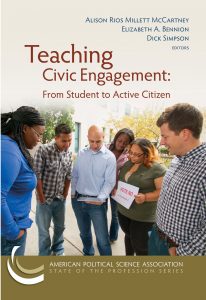
In the recently published, Teaching Civic Engagement: From Student to Active Citizen, published by the American Political Science Association, the authors not only affirm the need for giving students from all levels some community engagement experience and reflection, but even more specifically call for political engagement.
The time is now to incorporate the development of civically engaged citizens as a goal in the missions of higher learning. Curriculum should include, in addition to service-learning and civic education, the teaching of political engagement so that students participate in explicitly politically oriented activities that seek a direct impact upon political issues, systems, relations, and structures. (p.450)
The report is a catalogue of various attempts to do just that. The effective techniques reviewed fall among five kinds:
1) Political discussion and deliberation
2) Political research and action projects
3) Invited speakers and the use of non-university mentors
4) External placement as interns and workers
5) Structured reflection
Ultimately the authors present a series of recommendations that form an action agenda
1) Colleges and universities should educate for political participation.
2) The federal government should expand its funding for such civic engagement courses and programs at colleges and universities, rather than contracting funding.
3) High schools, community colleges, four-year colleges, and universities should adopt teaching civic and political engagement as a goal in their mission statements.
4) Assessment at the campus level is needed to determine how well universities are complying with federal mandate to offer students voter registration forms.
5) Institutions of higher learning need to comply with the federal mandate for an education program pertaining to the U.S. Constitution on September 17 of each year.
6) State and local governments should be encouraged to use students to assist in the administration of elections, especially as paid poll watchers and election judges.
7) Faculty should be encouraged to be politically active themselves.
8) APSA should adopt a code of ethics similar to that of social workers, which recognizes the benefits of faculty civic engagement.
9) Students should be encouraged to work with local governments, especially in smaller communities, to provide information on best practices.
10) It is the duty of political science faculty to provide students with the knowledge, skills, and tools to become informed advocates.
11) Civic and political engagement courses should be designed for cognitive and affective learning, along with effective service to the community.
12) Civic education should be encouraged at the high school level, especially those courses which already use simulations or service learning components.
13) More opportunities like the Model UN, Mock Trial, Congressional Debate, and national Student Issues Conventions should be developed.
14) Multiple courses should be created at the campus level with different goals to create distinctive learning opportunities and a ladder of experiences ins service-learning and civic and political engagement.
15) Reflection is more difficult than recognized, but it is essential to teaching political engagement.
16) If civic and political engagement is to receive recognition in the profession, gain support on campuses and at various levels of government, and become widely adopted in a more complete and integrated program, such as a minor degree and certificate programs, then it must be rigorously assessed by both qualitative and quantitative methods.
While this report talks about what responsibilities educational institutions have, individuals, families, government, and other organizations can also seek to encourage their members to be more civically and politically engaged citizens.So about that letter to government you've been meaning write to convey your concerns.... how about now...

No comments:
Post a Comment